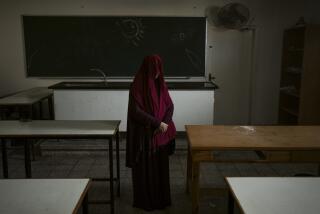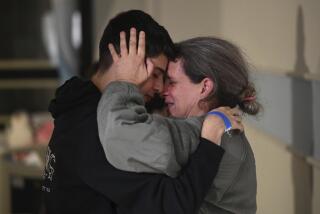Treatment of POWs Is Said to Violate Treaty
- Share via
WASHINGTON — Article 13 of the 1949 Geneva Convention on the treatment of prisoners of war states that they shall not be exposed to “public curiosity.” The images broadcast Sunday of American captives in uniform, terror on their faces as they are questioned about why they came to Iraq, clearly violate the rules, according to international law experts and human rights advocates.
The International Committee of the Red Cross joined Defense Secretary Donald H. Rumsfeld in denouncing the broadcasts on Iraqi television, which were picked up by the Qatar-based Al Jazeera satellite network.
“It’s very clear that prisoners of war shouldn’t be subject to public exposure,” Red Cross spokeswoman Nada Doumani told Agence France-Presse.
But the United States has also been criticized for images of prisoners it has captured. Indeed, it was the last nation publicly scolded by the Red Cross for the release of footage showing Al Qaeda and Taliban captives, bound and sullen, as they were transported to the Guantanamo Bay detention center in Cuba and placed in cages there.
And over the last week as well as during the 1991 Persian Gulf War, American media showed many images of long lines of surrendering Iraqi soldiers, hands in the air.
An Al Jazeera employee who requested anonymity noted that “everyone showed footage of Iraqi prisoners of war just a day ago, and no one said a thing about that.”
A Pentagon spokesman, Army Maj. Tim Blair, said photographers and camera crews traveling with U.S. military units were asked not to show Iraqi prisoners.
Experts note that the images of the Iraqi prisoners have not been as troublesome as the ones of the U.S. captives because they haven’t provided close-ups or identified individuals.
The Iraqi government more directly disregarded the ban, using the images of prisoners to show viewers that it is still in business and militarily potent.
“It was Iraqi state television,” said Tom Malinowski, Washington advocacy director for Human Rights Watch. “That’s clearly an Iraqi government conscious decision to show them being humiliated.”
Added St. Louis University law professor Derek P. Jinks, an expert in human rights issues: “This kind of thing can revivify the Iraqi spirit” and could inspire sympathizers and would-be terrorists.
A more immediate concern is what the broadcasts portend for the way the captive U.S. soldiers, as many as a dozen, are being treated off-camera -- although, as Michael F. Noone Jr., a Catholic University law professor and a former Air Force judge advocate, noted, “In a way, it’s good that it happened, because (a) we know they’re alive, and (b) we know they haven’t been badly mistreated.”
U.S. captives from the 1991 Gulf War were also shown on Iraqi television, with one, Navy Lt. Jeffrey N. Zaun, denouncing the war as unjustified.
He and other former prisoners later told of being tortured by the Iraqis.
Pentagon officials expressed concern even before this war began about treatment of prisoners by a regime with little left to lose.
“If the worst problem they face is being shown on camera, we would all breathe a sigh of relief,” Malinowski said.
Iraqi Defense Minister Sultan Hashim Ahmad Jabburi Tai said in a news conference Sunday that prisoners of war would be treated according to the Geneva Convention.
“Iraq will not harm the captured prisoners of war,” he said. “We have values and principles.”
But the interrogation techniques already broadcast -- in which the captives were asked for information beyond name, rank and serial number -- may violate the convention, Jinks said.
Alleged violators of the Geneva Convention can be put on trial as war criminals if they are captured.
Jinks said that anyone from the government official who ordered the broadcast to the camera operator who filmed the prisoners could be tried.
Theoretically, he added, those responsible for the appearance on television and torture of those captured in 1991 could also still be prosecuted.
*
Times researcher Jailan Zayan in Doha, Qatar, contributed to this report.
*
(BEGIN TEXT OF INFOBOX)
Rules on prisoners
Article 13, Geneva Convention of 1949 on the Treatment of Prisoners of War
“Prisoners of war must at all times be humanely treated. ...
“Likewise, prisoners of war must at all times be protected, particularly against acts of violence or intimidation and against insults and public curiosity.”
Source: Office of the U.N. High Commissioner for Human Rights
Los Angeles Times
More to Read
Sign up for Essential California
The most important California stories and recommendations in your inbox every morning.
You may occasionally receive promotional content from the Los Angeles Times.













